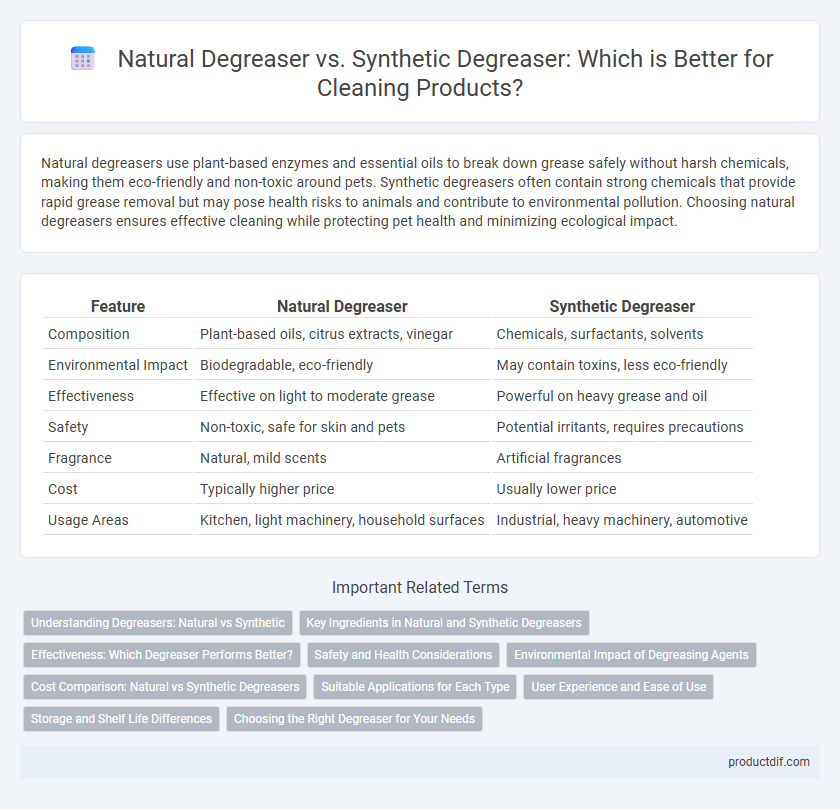Natural degreasers use plant-based enzymes and essential oils to break down grease safely without harsh chemicals, making them eco-friendly and non-toxic around pets. Synthetic degreasers often contain strong chemicals that provide rapid grease removal but may pose health risks to animals and contribute to environmental pollution. Choosing natural degreasers ensures effective cleaning while protecting pet health and minimizing ecological impact.
Table of Comparison
| Feature | Natural Degreaser | Synthetic Degreaser |
|---|---|---|
| Composition | Plant-based oils, citrus extracts, vinegar | Chemicals, surfactants, solvents |
| Environmental Impact | Biodegradable, eco-friendly | May contain toxins, less eco-friendly |
| Effectiveness | Effective on light to moderate grease | Powerful on heavy grease and oil |
| Safety | Non-toxic, safe for skin and pets | Potential irritants, requires precautions |
| Fragrance | Natural, mild scents | Artificial fragrances |
| Cost | Typically higher price | Usually lower price |
| Usage Areas | Kitchen, light machinery, household surfaces | Industrial, heavy machinery, automotive |
Understanding Degreasers: Natural vs Synthetic
Natural degreasers, derived from plant-based ingredients such as citrus extracts and essential oils, offer eco-friendly and biodegradable options that are effective for light to moderate grease removal. Synthetic degreasers, formulated with chemical surfactants and solvents, provide powerful grease-cutting capabilities ideal for heavy-duty industrial cleaning applications. Understanding the differences in composition and environmental impact helps select the appropriate degreaser for specific cleaning needs and sustainability goals.
Key Ingredients in Natural and Synthetic Degreasers
Natural degreasers primarily contain biodegradable ingredients such as citrus oils, vinegar, and enzymes that break down grease without harsh chemicals. Synthetic degreasers rely on petroleum-based solvents, surfactants, and chemical emulsifiers to dissolve greasy residues rapidly. Both types utilize specific active compounds tailored to effectively target grease, but natural options emphasize environmentally friendly and non-toxic components.
Effectiveness: Which Degreaser Performs Better?
Natural degreasers, often derived from citrus oils and plant-based enzymes, excel at breaking down grease in an eco-friendly manner but may require longer dwell times for tough stains. Synthetic degreasers typically contain powerful surfactants and solvents that provide faster and more aggressive grease removal, making them highly effective for industrial and heavy-duty cleaning. Choosing between natural and synthetic degreasers depends on balancing cleaning performance with environmental impact and surface sensitivity.
Safety and Health Considerations
Natural degreasers, derived from plant-based ingredients such as citrus oils and vinegar, offer safer alternatives with fewer toxic fumes and lower risk of skin irritation compared to synthetic degreasers containing harsh chemicals like glycol ethers and ammonia. Exposure to synthetic degreasers can increase respiratory issues and allergic reactions, whereas natural options often present biodegradable properties and reduced environmental impact. Choosing a natural degreaser promotes healthier indoor air quality and minimizes long-term health concerns for users and the environment.
Environmental Impact of Degreasing Agents
Natural degreasers, typically derived from plant-based oils and enzymes, offer a lower environmental footprint due to their biodegradability and reduced toxicity. Synthetic degreasers often contain harsh chemicals such as petroleum derivatives and phosphates, which can persist in ecosystems and contribute to water pollution and bioaccumulation. Choosing natural degreasing agents minimizes ecological disruption and supports sustainable cleaning practices.
Cost Comparison: Natural vs Synthetic Degreasers
Natural degreasers generally have higher upfront costs due to organic ingredients and eco-friendly sourcing, but they often reduce long-term expenses by minimizing environmental cleanup and health-related costs. Synthetic degreasers tend to be cheaper initially, offering strong immediate cleaning power at lower prices, but may incur hidden costs such as regulatory compliance, disposal fees, and potential health risks. Businesses must evaluate total cost of ownership, balancing product price against environmental impact and worker safety to determine the most cost-effective solution.
Suitable Applications for Each Type
Natural degreasers excel at removing light grease and oil stains on kitchen surfaces, fabrics, and delicate materials due to their biodegradable and non-toxic components. Synthetic degreasers are more effective for heavy-duty industrial applications, automotive parts cleaning, and stubborn grease removal where stronger chemical action is required. Choosing between natural and synthetic degreasers depends on the surface type, environmental impact considerations, and the severity of grease contamination.
User Experience and Ease of Use
Natural degreasers offer a gentler, non-toxic cleaning experience that minimizes skin irritation and environmental impact, enhancing user comfort during application. Synthetic degreasers typically provide faster grease breakdown and stronger cleaning power, but may emit stronger chemical odors and require careful handling to avoid skin or respiratory discomfort. Users often prefer natural degreasers for routine cleaning due to their safer formulation, while synthetic options are favored for heavy-duty tasks needing quick, intensive grease removal.
Storage and Shelf Life Differences
Natural degreasers typically have a shorter shelf life, often lasting 6 to 12 months due to their organic ingredients that can degrade over time. Synthetic degreasers boast extended storage capabilities, frequently maintaining effectiveness for 2 to 3 years because of their stable chemical formulations. Proper airtight storage and cool, dry conditions are essential for both types to maximize longevity and maintain cleaning efficacy.
Choosing the Right Degreaser for Your Needs
Natural degreasers, often derived from plant-based ingredients like citrus oils and vinegar, offer eco-friendly cleaning with minimal environmental impact and are ideal for light to moderate grease removal. Synthetic degreasers contain chemical surfactants and solvents designed for heavy-duty grease and industrial grime, providing faster and more powerful cleaning performance. Selecting the right degreaser depends on the cleaning surface, grease severity, and environmental considerations to ensure effective and safe results.
Natural degreaser vs synthetic degreaser Infographic

 productdif.com
productdif.com